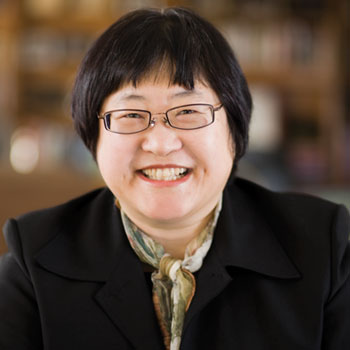Chen, Zhou Among Final Candidates for Composition Department Position

Composer-in-residence Chen Yi visited Oberlin this week to give lectures and master classes and hear students perform her music. She and her husband, Composer-in-residence Zhou Long, are applying to teach composition at the Conservatory.
September 26, 2014
The shrill whistle of a piccolo cast an eerie, mysterious mood for the opening of Composer-in-Residence Chen Yi’s lecture on Sept. 22. This tranquil solo began like a loon call on an open lake but was quickly interrupted by thunderous percussion. The contrast in the dynamics and texture of these disparate instruments was a bold move and demonstrated the uniqueness of Yi’s compositions.
Both Yi and her husband, Zhou Long, also a composer-in-residence at Oberlin, spent the week giving master classes, visiting classes and hearing their own compositions performed by Conservatory students. Both Yi and Zhou are finalists for a position in the Conservatory’s Composition department as well; Professor of Conducting and chair of the search committee Timothy Weiss said that a total of six finalists will visit campus throughout the semester.
As finalists, Yi and Zhou both have outstanding qualifications as internationally recognized composers. Zhou won a Pulitzer Prize for Music for his first opera, Madame White Snake, and received the Elise L. Stoeger Prize from Lincoln Center’s Chamber Music Society, the most prestigious prize awarded for the composition of chamber music. Yi received the Charles Ives Living Award in 2001 and was inducted into the American Academy of Arts and Sciences in 2005. Both currently hold positions as distinguished professors at the Conservatory of Music and Dance at the University of Missouri–Kansas City.
During her lecture on compositional technique, Yi casually mentioned composing a piece for cellist Yo-Yo Ma. Having suggested that Composition majors play each other’s work, she shared an anecdote from an interaction with Ma. He had been using a conventional fingering for a portion of the piece she had written based on a Chinese folk song. However, Ma, unsatisfied, asked her to sing the entire folk song out loud. He then made his fingering more challenging in order to match Yi’s style of singing. Yi ended the story by explaining that one can learn a lot from performers of a piece about how to notate a composition.
Yi also expressed her love of writing for children. “If you can write for kids, it is very good because they learn very quickly,” she said. A five-movement choral piece, arranged for girls ages six to sixteen with different ranges of singing abilities, showcased her skill in catering to the performers of her music. The lyrics of the movement for the youngest age group consisted of just four Chinese characters, while the eldest girls sang a movement with 15 different intertwining parts. Yi also urged students to write choral music. “I want to encourage you to write for a choir, because there are choirs everywhere,” she said.
Yi and Zhou’s work, played in an Oberlin Sinfonietta concert on Sept. 23, reflected a thoughtful interweaving of Chinese and Western influences, a characteristic reflected in many of their pieces. Yi’s “Happy Rain on a Fall Night” drew inspiration from a poem by Du Fu from the eighth century Tang dynasty. Weiss, who conducted Tuesday’s concert, said the melodic contour of the piece matches the speech inflection of the poem when recited in Chinese, taking advantage of the musical nature of Chinese tones.
Zhou’s piece, “Bell Drum Towers,” was a tribute to the eponymous towers in Beijing, near where Zhou grew up. During the Yuan, Ming and Qing Dynasties (1271–1912), the bell towers served as central points of reference for time and place. Additionally, the bell is the heaviest in China. Percussion played an important role in the piece’s instrumentation; sometimes the rhythm would be front and center with clear, defining beats, while at other times the beat faded into the background, growing increasingly distant. This mirrored how one conceptualizes time. Sometimes it is loud and demanding, while other times its passing goes nnoticed.
Weiss will also be conducting another concert featuring different works of Yi and Zhou on Friday, Sept. 26 at 8 p.m. in Warner Concert Hall. The couple’s work will be paired with that of Augusta Read Thomas and Bernard Rands, another composer couple. “There are not too many of those combinations [of composer couples] in the contemporary field,” Weiss said.
Weiss had already been planning to perform the Yi and Zhou works as well as to record Thomas’s Bassoon Concertino. “Since I had those three, I thought it made sense to add the Bernard Rands piece,” Weiss said. He also said that while the other pieces are busy, energetic and loud, Rands’s Scherzi is more contemplative and filled with space, balancing out the other pieces.
The Composition department experiences regular turnovers in its quest to keep its innovative edge. Fortunately, both Yi and Zhou can offer valuable perspectives and have been well-received by students in concerts and classes alike.




















